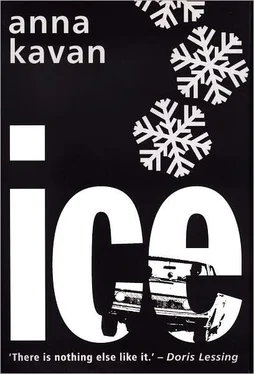He told me about the hallucination of space-time, and the joining of past and future so that either could be the present, and all ages accessible. He said he would take me to his world, if I wanted to go. He and others like him had seen the end of our planet, the end of the human race. The race was dying, the collective death-wish, the fatal impulse to self-destruction, though perhaps human life might survive. The life here was over. But life was continuing and expanding in a different place. We could be incorporated in this wider life, if we chose.
I tried to understand. He was a man, but seemed more; he was not what I was. He had access to superior knowledge, to some ultimate truth. He was offering me the freedom of his privileged world, a world my inmost self longed to know. I felt the excitement of the unimaginable experience. From the doomed dying world man had ruined, I seemed to catch sigh of this other one, new, infinitely alive, and of boundless potential. For a second I believed myself capable of existing on higher level in that wonderful world; but saw how far it was beyond my powers when I thought of the girl, the warder the spreading ice, the fighting and killing. I was part of all that, irrevocably involved with events and persons upon this planet. It was heartbreaking to reject what a part of me wanted most. But I knew that my place was here, in our work under sentence of death, and that I would have to stay and see it through to the end.
The dream, the hallucination, or whatever it was, had a powerful effect on me afterwards. I could not forget it, could not forget the supreme intelligence and integrity of that dream-face. I was left with a sense of emptiness, loss, as if something precious really had been in my grasp, and I had thrown it away.
It did not seem to matter what I did now. I was committed to violence and must keep to my pattern. I managed to react the mainland where guerrilla fighting was going on, and, indifferent to everything, joined a company of mercenaries in the pay of the west. We fought in the marshes, in the delta of a tidal river with many mouths, thigh-deep in mud most of the time. More men had been lost in the mud than through enemy action when finally we were withdrawn. It seemed to me we were fighting against the ice, which was all the while coming steadily nearer, covering more of the world with its dead silence, its awful white peace. By making war we asserted the fact that we were alive and opposed the icy death creeping over the globe.
I still felt I was waiting for something fearful to happen, but in a curious sort of suspended state. There was an emotional blockage. I recognized it in others besides myself. In suppressing food riots, our machine guns indiscriminately cut own rioters and harmless pedestrians. I had no feeling about it and noticed the same indifference in everyone else. People stood looking on as at a performance, did not even attend to the wounded. I had to share a sleeping tent with five other men for a time. They had fantastic courage, but no idea of danger, of life, death, anything; were satisfied as long as they got a hot meal every day with meat and potatoes. I could not make any contact with them; hung up my overcoat as a screen and lay sleepless behind it.
Presently I began to hear the warden mentioned again. He was attached to western headquarters, held an important post here. I remembered his wish to co-operate with the big powers, and admired the way he had achieved it. Thinking of him made me restless. It seemed idiotic to spend my last days in a hired fighting unit, and I decided to ask him to find me a job in which I would have more scope. The problem was how to reach him. Our leader was the only person who occasionally had direct dealings with the higher command, and he refused to help me, interested in nothing but his own advancement. For days we had been attacking a strongly- defended building said to contain secret papers. He would not ask for reinforcements, determined to get the credit for taking the place unaided. By a simple trick, I enabled him to capture the building and send the documents to headquarters, for which he was highly praised.
Impressed by my ingenuity, he asked me to have a drink with him, offered me promotion. He was making a personal report the next day, and I said that the only reward I wanted was to go to headquarters with him. He replied that he couldn’t spare me, I must give him more of these tips. He was half drunk. I deliberately encouraged him to go on drinking until he passed out. In the morning, when he was about to start, I jumped into his car, pretending he had promised to take me, relying on his having been too drunk the previous night to remember what had been said. It was a nasty moment. He clearly suspected something. But he did not have me thrown out of the car. I drove with him to headquarters, neither of us speaking a word the whole way.
They had built their headquarters far away from the battlefields, a large clean new building, flying a large clean flag. Stone and concrete, it stood out solid, massive, expensive, indestructible looking, among the low, old, ricketty wooden houses. Apart from the sentries at the main entrance, it seemed to have nothing to do with war. No other guards were visible. Inside there appeared to be no security precautions at all. I recalled the commander’s drunken remark: perhaps these people really were too soft to fight; relying on their technological supremacy, on the gigantic size and wealth of their country, believed they need not dirty their hands with the actual fighting, paid their inferiors to do that.
I was directed to the warden’s suite. The place was air-conditioned. Elevators rose smoothly, silently, swiftly. Thick carpets stretched from wall to wall of the wide corridors. After the squalid discomfort in which I had been living, it was like a luxury hotel. Lights blazed everywhere in spite of the sunshine outside. Windows were hermetically sealed, not made to open. The resulting atmosphere was slightly unreal.
A woman secretary in uniform told me the warden could see no one. He was leaving immediately on a tour of inspection and would be away some days. I said: ‘I must see him before he goes. It’s urgent. I’ve come all this way specially.
I won’t keep him a minute.’ She pursed her lips, shook her head. ‘Absolutely impossible. He has important papers to sign and gave orders that nobody was to disturb him.’ Her well made-up face was adamant, uncomprehending. It annoyed me. ‘To hell with that! I tell you I must see him! It’s a personal matter. Can’t you understand?’ I wanted to shake her to get some human expression into her face. Instead, I made my voice calm. ‘At least tell him I’m here and ask whether he’ll see me.’ I felt in my pockets for some means of identification, then wrote my name on a pad. While I was doing so a colonel came in. The secretary went over and whispered to him. At the end of their confabulation the man said he would give the message himself, took the paper with my name on it and left the room by the same door through which he had just entered. I knew he had no intention of telling the warden about me. Only decisive action on my part would get me a interview. Soon it would be too late.
‘Where does that door lead?’ I asked the secretary, pointing to one at the other end of the room. ‘Oh, that’s strictly private. You can’t go in there. It’s forbidden.’ For the first time she began to lose her superior calm and to look flustered. She had not been trained to deal with a direct approach. I said: ‘Well I’m going in,’ moved towards the door. ‘No!’ She flew to stand in front of it, barring my way. The country she belonged to was so firmly convinced of world power that its nationals could not conceive of real opposition from anyone, even over the smallest issue. I smiled, pushed her aside. She clung on to my clothes, holding me back. There was a brief scuffle. I heard a voice I recognized beyond the closed door. ‘What’s going on there?’ I went in. ‘Oh, it’s you, is it?’ He seemed singular! unsurprised. In the doorway the secretary was talking fast and apologetically. He waved her away. The door shut. I said: ‘I must speak to you.’
Читать дальше












